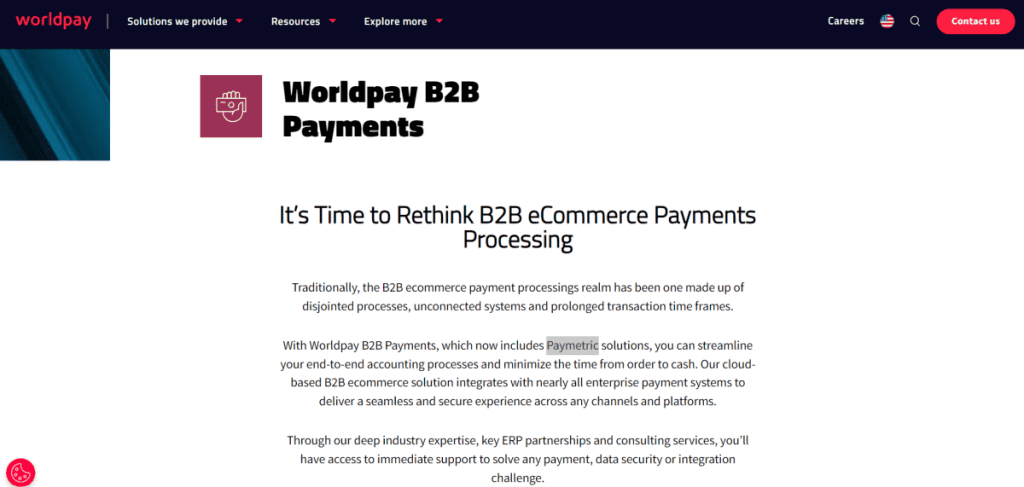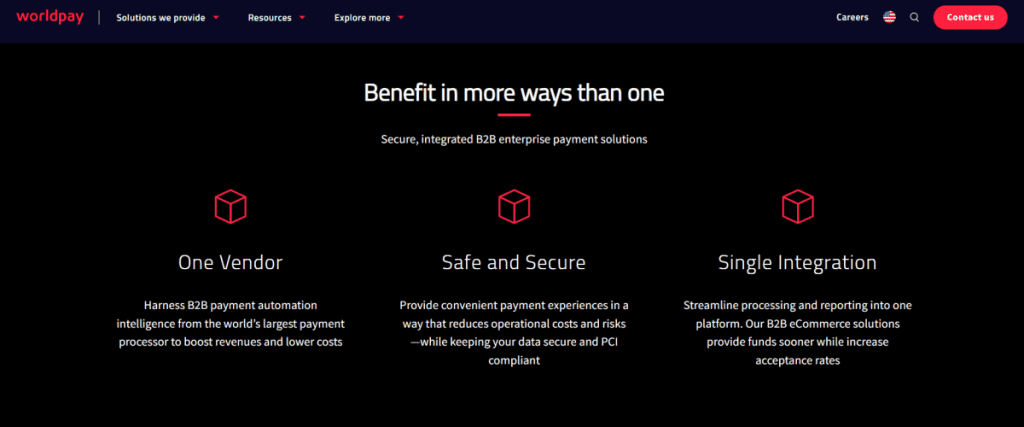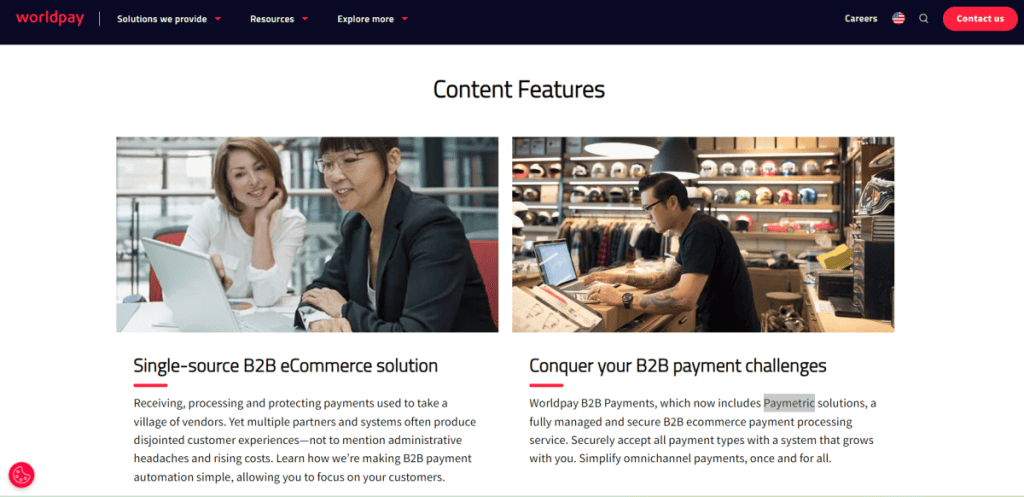
Paymetric Review
- 27th Aug, 2024
- | By Linda Mae
- | Reviews
Paymetric, founded in 1998 and based in Roswell, Georgia, specializes in secure, integrated payment solutions for big companies. They have become known in the payment processing field by providing innovative services that improve the security and efficiency of electronic payments, especially in systems like SAP and Oracle used by large businesses. Let’s delve deeper into the Paymetric Review.
The company focuses on combining electronic payment processing with enterprise systems to guarantee a smooth and safe order-to-cash process. This is vital for big companies that manage huge volumes of payment data on various platforms. Paymetric’s solutions aim to simplify these procedures, cut operational expenses, and lessen risks linked to payment data breaches. Their services comply with PCI standards and use patented tokenization technology to replace payment data with secure tokens, reducing the need for PCI compliance.
In the broader payment processing industry, it is recognized for its ability to adapt to the needs of enterprise clients. Its processor-neutral, cloud-based solutions are highly valued by businesses that require robust, scalable payment systems capable of handling complex transactions across various platforms. This capability positions Paymetric as a critical player in the payment processing sector, especially for organizations that prioritize security and efficiency in their payment operations.
It gained more significance in the industry when it was bought by Worldpay in 2017. This acquisition helped Paymetric grow its influence and abilities in the worldwide payment processing market. As a division of Worldpay, it keeps providing tailored services for big companies, enhancing its status as a top provider of secure and integrated payment solutions.
Key Features and Capabilities | Paymetric Review
Paymetric is a leader in providing secure and efficient payment processing solutions, particularly for large enterprises that require seamless integration with existing systems. Here are some of the key features and capabilities that set Paymetric apart:
Secure Payment Processing
It ensures that all payment transactions are handled with the utmost security. Utilizing advanced encryption and tokenization technologies, the platform protects sensitive payment information from potential breaches. This level of security not only safeguards customer data but also helps businesses maintain trust and compliance with industry standards.
Integration with ERP and CRM Systems
A significant advantage of Paymetric is its ability to integrate seamlessly with major ERP and CRM systems like SAP and Oracle. This integration allows businesses to streamline their financial processes, ensuring that payment data is automatically synchronized across all relevant platforms. This reduces manual entry errors and enhances overall operational efficiency.
Support for Multiple Payment Methods
It provides a wide range of payment options, allowing businesses to accept payments through different avenues. This encompasses conventional credit and debit card transactions, along with ACH transfers and various other electronic payment methods. This adaptability is essential for businesses operating in various markets or working with global customers.
Tokenization and Data Security
One of Paymetric’s most powerful features is its patented tokenization technology. This process replaces sensitive payment information with a secure, randomly generated token that cannot be used by unauthorized parties. By using tokenization, it significantly reduces the risk of data breaches, as the actual payment information is never stored or transmitted in its original form.
PCI Compliance and Risk Management
It helps businesses meet the stringent requirements of the Payment Card Industry Data Security Standard (PCI DSS). Its solutions are designed to minimize the scope of PCI compliance by reducing the amount of sensitive data that businesses need to handle. Additionally, Paymetric’s risk management tools enable companies to monitor and mitigate potential security threats in real-time, ensuring that they remain compliant and secure.
Technology and Innovation
It leads in technology advancements in the payment processing field, providing strong and flexible solutions for big companies. The company uses the latest technology to help its clients keep their payment systems efficient, safe, and able to grow as needed.
Overview of the Technology Stack
Paymetric’s technology stack is designed to provide a comprehensive and seamless payment processing experience. Built on a secure and scalable architecture, the platform integrates various technologies that ensure high performance and reliability. The use of state-of-the-art encryption, tokenization, and secure APIs allows Paymetric to offer an enterprise-grade solution that can handle large volumes of transactions while maintaining data integrity and security.
AI and Machine Learning in Payment Processing
Artificial Intelligence (AI) and Machine Learning (ML) play a significant role in enhancing Paymetric’s payment processing capabilities. These technologies are used to analyze transaction data in real-time, enabling the detection of fraudulent activities with greater accuracy. By continuously learning from transaction patterns, Paymetric’s AI-driven systems can predict potential risks and optimize the payment process, ensuring a secure and efficient operation for businesses.
Customization and Scalability
It is known for providing solutions that can be easily adjusted to fit the needs of different clients. It doesn’t matter if a company is dealing with a small number of transactions or a very large amount; Paymetric’s system can be modified to suit these needs. The company’s adaptable methods help businesses add payment processing to their usual processes without causing any problems, which is why it’s a popular choice among big companies.
Cloud-Based Solutions
Paymetric’s cloud-based solutions provide enterprises with the flexibility and accessibility needed in today’s fast-paced business environment. By leveraging the cloud, it ensures that its services are always available, easily scalable, and capable of handling large volumes of transactions without the need for extensive on-premises infrastructure. This not only reduces costs for businesses but also enhances their ability to manage payments across different regions and platforms efficiently.
Integration and Compatibility
Paymetric excels in offering seamless integration and compatibility with various enterprise systems, making it a preferred choice for large businesses looking to streamline their payment processing. The platform’s ability to integrate with major ERP systems like SAP and Oracle, along with its compatibility with eCommerce platforms, ensures that companies can manage their financial operations efficiently without disruptions.
Integration with SAP and Oracle Systems
One of the standout features of Paymetric is its deep integration with SAP and Oracle systems. These ERP systems are widely used by large enterprises to manage various aspects of their business operations, including finance, supply chain, and human resources. Paymetric’s integration allows businesses to process payments directly within these systems, ensuring a seamless flow of payment data across the organization. This not only enhances efficiency but also reduces the risk of errors that can occur when transferring data between different systems. By embedding payment processing within the ERP environment, it helps businesses maintain consistency and accuracy in their financial operations.
Compatibility with eCommerce Platforms
Paymetric is not only well-integrated with ERP systems but also works seamlessly with various eCommerce platforms. This ensures that businesses can seamlessly incorporate Paymetric’s payment processing features into their online stores, offering customers a secure and seamless checkout process. Whether a company utilizes well-known platforms such as Magento, Shopify, or personalized solutions, it provides the adaptability required to accommodate different online payment options, simplifying the process of overseeing eCommerce activities in addition to conventional sales outlets.
API and Developer Support
Paymetric also provides robust API and developer support, which is crucial for businesses that require custom integrations or need to extend the functionality of their payment systems. The platform offers a comprehensive set of APIs that allow developers to integrate Paymetric’s payment processing capabilities into their existing applications or build new solutions tailored to specific business needs. This support ensures that businesses can fully leverage Paymetric’s capabilities, whether they are using out-of-the-box solutions or developing custom applications to meet unique requirements.
User Experience and Interface
It has established itself as a leading payment processing solution by prioritizing user experience and delivering an intuitive interface that caters to the needs of businesses. Its platform is designed to be user-friendly, with a focus on ease of use, robust customer portal features, and comprehensive reporting and analytics tools that empower businesses to manage their payment operations effectively.
Ease of Use for Businesses
One of Paymetric’s key strengths is its ease of use. The platform is designed to streamline complex payment processes, allowing businesses to handle transactions with minimal effort. The user interface is intuitive, making it easy for users to navigate through different features without requiring extensive training. This simplicity is particularly beneficial for large enterprises that need to manage a high volume of transactions efficiently. Paymetric’s design philosophy centers on reducing the learning curve, enabling businesses to integrate and utilize its solutions quickly and effectively.
Customer Portal and Dashboard Features
It provides a user-friendly customer portal that gives companies a complete overview of their payment operations. The portal’s dashboard can be tailored to the user’s needs, making it easy to keep an eye on important metrics, check the status of payments, and handle transactions as they happen. This kind of control and insight is essential for businesses that want to keep their finances in check. The portal also allows multiple users to access it, so various teams within a company can work together smoothly while keeping data safe and accurate.
Reporting and Analytics Tools
To further enhance user experience, Paymetric includes advanced reporting and analytics tools within its platform. These tools provide businesses with deep insights into their payment data, helping them identify trends, monitor performance, and make informed decisions. The reports are customizable, allowing users to generate detailed analytics tailored to their specific needs. Whether it’s tracking payment efficiency, identifying potential issues, or analyzing customer behavior, Paymetric’s reporting and analytics capabilities equip businesses with the information they need to optimize their operations and drive growth.
Pricing and Contract Terms
Paymetric, known for its secure and integrated payment solutions, also offers a variety of pricing models and contract terms tailored to meet the needs of large enterprises. Understanding the pricing structure and contract details is essential for businesses considering Paymetric as their payment processing partner.
Overview of Pricing Structure
It has a pricing model that caters to enterprise clients, although the exact details may not always be easily accessible to the general public. The company usually operates on a subscription model, in which businesses pay a recurring fee to use Paymetric’s services. This model could consist of various service tiers or levels, which will vary based on the features and support needed by the business. Though the exact rates may differ depending on the scope and scale of services offered, it is widely believed that Paymetric’s pricing is competitive in the enterprise payment processing industry.
Subscription Models and Licensing Fees
The subscription models offered by Paymetric are likely tailored to the specific needs of each client, taking into account factors such as the volume of transactions, the complexity of integrations, and the level of support required. Licensing fees may be included in the subscription, particularly for businesses that need specialized integrations with ERP systems like SAP or Oracle. These fees can vary significantly depending on the complexity of the implementation and the specific features that a business requires. Paymetric’s approach allows for flexibility, enabling businesses to select a pricing model that best suits their operational needs.
Contract Terms and Conditions
Paymetric’s contract terms are designed with enterprise clients in mind, often including multi-year agreements that provide stability and predictability for both parties. These contracts typically feature automatic renewals unless notice is given within a specified period before the contract’s expiration. Additionally, Paymetric’s contracts may include clauses related to early termination fees, which are common in the industry. Such fees are intended to cover the costs associated with ending the service agreement before the end of the contract term. Businesses should carefully review these terms to ensure they align with their long-term strategic goals and operational requirements.
Customer Support and Service
It highly values offering thorough customer support and service, acknowledging its crucial role in upholding client satisfaction and guaranteeing the efficiency of its payment processing solutions. The support infrastructure of the company is intended to be both reactive and proactive, catering to the various requirements of enterprise customers.
Availability and Responsiveness
Paymetric offers robust customer support that is available 24/7, ensuring that businesses can receive assistance whenever they need it. This around-the-clock availability is particularly important for large enterprises that operate across multiple time zones and cannot afford downtime in their payment processing systems. The company’s support team is known for its prompt responsiveness, addressing queries and issues efficiently to minimize disruption to business operations. Whether it’s a simple question or a complex technical issue, Paymetric’s support staff are equipped to handle a wide range of client needs.
Technical Support and Training
In addition to general customer service, Paymetric provides specialized technical support to help businesses integrate and optimize their payment processing systems. This includes assistance with integrating Paymetric’s solutions into existing ERP systems like SAP and Oracle, as well as troubleshooting any technical issues that may arise. Paymetric also offers training programs to ensure that clients’ internal teams are well-versed in using the platform effectively. These training sessions can be customized to meet the specific needs of the business, ensuring that users can fully leverage the capabilities of the Paymetric platform.
Customer Success Programs
Paymetric is dedicated to making sure its customers are happy, not just by providing basic help. They have special programs designed to assist companies in reaching their important objectives by using Paymetric’s services effectively. These programs usually involve regular meetings, checking how things are going, and giving advice that fits each customer’s specific needs. By building lasting relationships with their customers, Paymetric helps businesses not only fix current problems but also improve their payment systems for future success.
Pros and Cons of Paymetric
Paymetric is widely regarded for its secure and efficient payment processing solutions, particularly for large enterprises. Below is an overview of the platform’s strengths and areas where improvements could be made.
Strengths of Paymetric
Integration with ERP Systems: One of Paymetric’s greatest strengths is its seamless integration with major ERP systems such as SAP and Oracle. This allows businesses to manage payments directly within their existing enterprise systems, streamlining operations and improving data accuracy.
Advanced Security Features: Paymetric is famous for its strong security measures, especially its patented tokenization technology, which safeguards sensitive payment information by substituting it with secure tokens. This greatly decreases the chances of data breaches and improves overall security.
Scalability and Customization: Paymetric offers highly scalable solutions that can be customized to meet the specific needs of different businesses. Whether a company processes a few thousand or millions of transactions, Paymetric’s platform can handle the workload efficiently without compromising performance.
Comprehensive Support: The platform offers top-notch customer service, with round-the-clock availability and expert technical support. Moreover, Paymetric provides training and customer success initiatives to assist companies in maximizing the platform’s functionalities.
Areas for Improvement
Pricing Transparency: One area where Paymetric could improve is in the transparency of its pricing structure. While the company offers competitive pricing, the lack of publicly available information about specific rates and fees can make it difficult for businesses to assess the cost-effectiveness of the platform.
Complexity for Smaller Businesses: Paymetric works very well for big companies, but it could be too complicated or have too many features for smaller businesses that don’t need all of that. Smaller companies might think the platform has more than they need, which could mean they don’t use the service to its full potential.
Contract Flexibility: Some users have noted that Paymetric’s contract terms, which often include multi-year agreements with early termination fees, could be more flexible. Offering more adaptable contract options might make the platform more accessible to a broader range of businesses.
Overall, Paymetric is a powerful and secure payment processing solution with notable strengths in integration, security, and scalability. However, improvements in pricing transparency, simplicity for smaller businesses, and contract flexibility could enhance its appeal further.
Competitor Comparison
In the payment processing industry, Paymetric competes with several leading companies, each offering a variety of services tailored to enterprise needs. Understanding how Paymetric stacks up against its competitors can provide valuable insight for businesses considering their options.
Comparison with Leading Competitors
Paymetric faces stiff competition from rivals such as Stripe, Adyen, and Worldpay, all of which provide unique benefits. Stripe is famous for its platform that is friendly to developers and its strong API support, which makes it a top choice for tech-savvy businesses that need a lot of customization. On the contrary, Adyen is known for its worldwide coverage and capacity to manage various payment options, making it perfect for companies with a sizable global footprint. Worldpay, a major player in the payment processing industry, provides a wide range of services like Paymetric, but is better recognized for its wide market presence and comprehensive solutions in different sectors.
Compared to these competitors, Paymetric excels in its specialized focus on integration with ERP systems like SAP and Oracle. While Stripe and Adyen offer flexibility and global payment capabilities, Paymetric’s deep integration with ERP systems provides a significant advantage for large enterprises that need to manage complex financial operations within these platforms. Additionally, Paymetric’s focus on security, particularly its patented tokenization technology, is a key differentiator, offering a level of data protection that is crucial for enterprises handling sensitive payment information.
Unique Selling Points of Paymetric
Paymetric stands out with its smooth integration with Enterprise Resource Planning (ERP) systems, its use of sophisticated methods to hide and protect sensitive data, and its ability to grow with big companies. Unlike many other companies, Paymetric creates solutions that fit right into the current ERP systems businesses already use. This is important for companies wanting to make their payment systems more efficient without changing how they currently work. Also, Paymetric’s emphasis on following rules for secure payments and managing risks sets it apart from other companies that might offer more general services but not as specifically tailored.
Conclusion
Paymetric offers robust, secure, and integrated payment solutions tailored for large enterprises, particularly those utilizing ERP systems like SAP and Oracle. With advanced security features, seamless integration, and scalability, Paymetric stands out in the payment processing industry. It is highly recommended for businesses seeking specialized, secure, and scalable payment processing solutions.
FAQs
How does Paymetric ensure data security?
Paymetric ensures data security through advanced tokenization and encryption technologies, replacing sensitive payment data with secure tokens. Additionally, the platform is PCI-compliant, meeting industry standards for data protection and minimizing the risk of data breaches.
What industries benefit the most from Paymetric?
Businesses that deal with many transactions and need to connect with ERP systems, like stores, factories, and hospitals, get the most advantages from Paymetric’s safe and adjustable payment methods.
What are the integration options available with Paymetric?
Paymetric provides smooth connections with big ERP systems such as SAP and Oracle, and works well with different online shopping platforms. They offer full API and developer tools to create personalized solutions.



